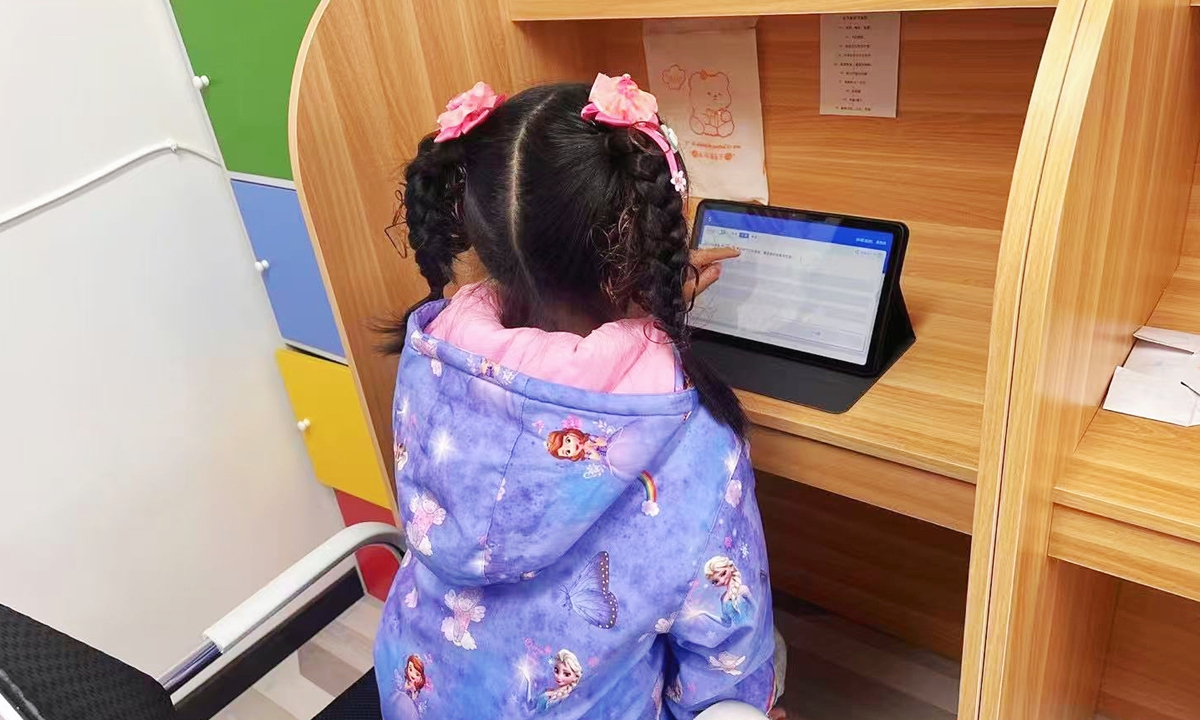
A student uses the learning devices to study in an AI self-study room in Beijing's Fengtai District in December, 2024.
Several regions in China are promoting general artificial intelligence (AI) education in primary and secondary schools, with cities like Beijing, Guangzhou, and Chengdu, Southwest China's Sichuan Province, rolling out implementation plans. These plans specify class hour requirements for each school stage, establish a connection mechanism from primary to high school, and incorporate AI course evaluations into students' overall assessment.
Beijing's primary and secondary schools will fully implement general AI education, starting this fall semester with no fewer than eight class hours per academic year, Beijing Broadcast Television (BRTV) News reported Monday.
The recently introduced regulations establish a seamless connection mechanism across different school stages for AI education. They also state that AI course evaluation results will be included in students' comprehensive quality assessments, said the report.
The Beijing Municipal Education Commission stated that AI courses can be offered independently or integrated with related subjects such as information technology and science. The courses will focus on four areas related to AI: basic concepts, applications and technologies, implementation methods, and ethics and society.
Zhan, a teacher at a secondary school in Beijing's Chaoyang District, told the Global Times on Monday that the new regulations add AI course requirements on top of the existing curriculum.
"Currently, elective courses already include AI-related content. Meanwhile, teachers are encouraged to incorporate AI tools into instruction, such as using AI to provide real-time classroom feedback and student evaluations," Zhan said.
South China's Guangdong Province also issued regulations outlining the AI curriculum, which consists of four parts: AI and life, AI implementation technologies, AI practice and innovation, and AI and society.
In the "AI implementation technologies" section, different learning objectives are set for each educational stage. Primary school students are introduced to basic concepts of machine learning and data processing in a simple way and experience human-computer and human-intelligence interaction through graphical programming platforms.
At the junior high level, students learn through examples about the relationship between data processing, algorithms, and computing power, and explore different implementation methods based on specific problem scenarios.
At the high school level, courses focus on helping students understand the fundamentals and limitations of machine learning and deep learning, as well as the trends and applications of key AI technologies.
The regulation also requires students to learn how to use common data labeling tools, solve issues like incomplete or inaccurate data, understand key machine learning algorithms such as classification, clustering, and decision trees, and gain an overview of core AI applications in speech recognition, image processing, natural language processing, biometric identification, and generative AI.
A high school in Chengdu is collaborating with universities and high-tech companies to develop special STEM courses like robotics, drones, computer science, math modeling, chemistry and materials, and future cities. Students are encouraged to plan their future careers based on their interests and strengths, China News Service reported.
According to the regulation issued by the Beijing Municipal Education Commission, AI course evaluations will be integrated into students' comprehensive assessment systems throughout primary and secondary school.
Students' AI application skills will be evaluated through knowledge tests, project presentations, work exhibitions, and thematic debates, while electronic learning portfolios will track their learning progress, staged achievements, and skill development in real time.
Beijing will also leverage local technological resources, such as universities, research institutes, and high-tech companies, to support AI education. More facilities like AI labs, experience centers, and exhibition halls will be established to allow students to engage with AI firsthand, BRTV reported.
















